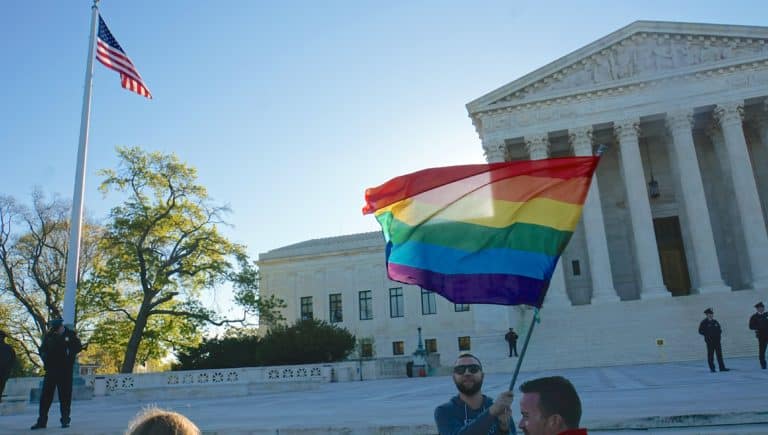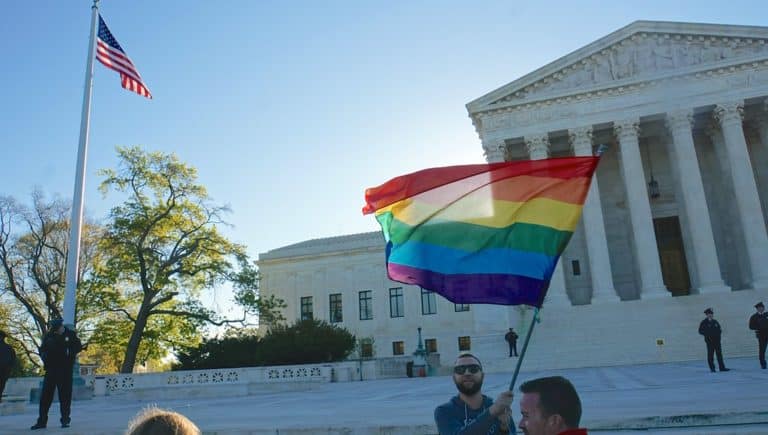Adrienne Spiegel is a student at Harvard Law School.
On Wednesday a three-judge panel of the Eighth Circuit heard oral argument in Horton v. Midwest Geriatric Management, LLC. The case concerns whether Title VII’s prohibition on employment discrimination “because of sex” prohibits discrimination because of an employee’s sexual orientation. The panel’s decision will have significant consequences for Mark Horton – the plaintiff, whose job offer was rescinded after he disclosed that he was gay – and for employees throughout the Eighth Circuit. Its effects may be felt across the country as well: a finding that sexual orientation is not protected would deepen an emerging circuit split, perhaps making it more likely that the Supreme Court will step in to resolve the question. The Court could do so as early as this morning.
During oral argument, Judges Loken, Stras, and Wollman focused questioning on whether they were bound by two prior Eighth Circuit cases. (My analysis here is based on an audio recording of argument, not a transcript, so attribution of questions and statements to the judges is based on my best assessment of their voices.) Horton’s lawyer, Greg Nevins of Lambda Legal, was able to get in one argument on the merits first. He opened by comparing this case to Phillips v. Martin Marietta Corp., a 1971 case where the Supreme Court found that absent business necessity, Title VII does not allow an employer to maintain one hiring policy for men and a different policy for women. This is just such a case, Nevins argued: the employer’s policy to hire women dating men, but not men dating men, was impermissible.
Judge Stras cut in to note that the panel need not even get to this central issue if it was bound by the Eighth Circuit’s decision in Williamson v. A.G. Edwards & Sons, Inc. Decided in 1989, Williamson is a four-paragraph per curiam opinion that states, “Title VII does not prohibit discrimination against homosexuals.” Nevins argued that the statement is not binding because the plaintiff-appellant in Williamson only raised a race discrimination claim on appeal. Thus, the sexual orientation issue was not actually before the Williamson court. Judge Loken seemed to accept that Williamson might be nonbinding dicta, but what about Sommers v. Budget Mktg., Inc.? In Sommers, the Eighth Circuit held that Title VII does not cover gender identity discrimination. Nevins attempted to explain that Sommers is inapposite: that case was about gender identity and this case is about sexual orientation. Judge Loken was unpersuaded. He told Nevins the relevance of the distinction to the question of what “sex” means in Title VII is “not that clear to me at all.” It bears mention that other courts have grasped and indeed relied on the distinction. For example, in EEOC v. R.G. & G.R. Harris Funeral Homes, the Sixth Circuit held that Title VII does cover gender identity, even in light of binding circuit precedent that Title VII does not cover sexual orientation because the distinction amounted to “a different legal question.”
Finally, Nevins was asked what the panel should make of the fact that Congress has considered amending Title VII to explicitly add “sexual orientation” ten times, and every time it has declined to do so. Nevins responded by citing Pension Benefit Guar. Corp. v. LTV Corp., where the Supreme Court stated, “[S]ubsequent legislative history is a ‘hazardous basis for inferring the intent of an earlier’ Congress.” Nevins closed by reminding the court that Oncale v. Sundowner Offshore Servs., Inc. charges courts to recognize all claims that meet the statutory requirements, regardless of whether the enacting Congress could have anticipated them.
Gail Coleman of the EEOC continued argument on behalf of Horton. She began by arguing that even if the panel finds that Williamson’s statement is not dicta, it has been abrogated by Price Waterhouse v. Hopkins and Oncale. The panel was unconvinced that Williamson’s failure to cite Price Waterhouse indicated that the Williamson court was unaware of Price Waterhouse, but seemed satisfied that Oncale, which came down after Williamson, might require a different understanding of Title VII. Coleman re-emphasized that per Oncale, “what matters is the words of the statute.” She also cited Henson v. Santander Consumer USA Inc., a 2017 case in which the Supreme Court declined to speculate about what Congress might have done if it faced a question that it never in fact faced. Judge Stras then asked Coleman a question he called “a little unfair”: why can’t they require that the words “sexual orientation” be in Title VII before finding that sexual orientation is protected, especially when other statutes do list “sexual orientation” as a protected category? Coleman responded simply that Congress often uses a “belt and suspenders approach.”
Neil Perryman of Lewis Rice, LLC, argued for the defendant-appellee Midwest Geriatric Management, Horton’s prospective employer. Perryman began by stating that Williamson precludes review in this case. Judge Stras jumped in: “I think you’re overstating it a bit.” Judge Stras acknowledged that, as he mentioned to Nevins, Williamson may have considered sexual orientation as part of its reasoning, but it is a bridge too far to say that sexual orientation was part of that case’s holding. Perryman responded by noting that the pro se complaint in Williamson was difficult to parse, but suggested its sexual orientation claims were inextricably tied up with its race discrimination claims. In any case, Perryman continued, Williamson itself is beside the point because in 1999, in Schmedding v. Tnemec Co., the Eighth Circuit, in a footnote, characterized Williamson as holding that Title VII does not protect sexual orientation. This prompted Judge Stras to ask the philosophical question: Is one case’s interpretation of an earlier case’s potential dicta as a holding binding on a subsequent panel, if the panel views the original case differently? Perryman responded that the intervening case should be entitled to some weight, and Judge Wollman indicated that he agreed. Perryman then discussed Horton’s religious discrimination claims. Having faced few questions from the bench, Perryman concluded his argument after only six minutes.
Nevins returned for rebuttal. He briefly addressed three new issues. First, he argued that even under an “original public meaning” theory of statutory interpretation (a theory the Supreme Court might be poised to use when interpreting Title VII), sexual orientation should be covered. Properly used, Nevins explained, the theory asks whether any word in the statutory provision at issue has a different meaning now than at the time of passage. “Discriminate” means the same thing now as it did in 1964, as does “sex.” Nevins, perhaps gratuitously, went on: “We are accepting male or female as the definition of the word ‘sex.’” (Many transgender, gender-nonconforming, and intersex folks would beg to differ.) Second, Nevins contrasted Title VII with the ADA, which explicitly includes an exception for sexual orientation. Since Title VII includes no such exception, it would be improper for the court to impose one. Finally, in response to a question from the bench, Nevins reminded the panel that two cert petitions currently pending at the Supreme Court present facts like those at issue here. He assured the panel it could stay its hand and wait for the Supreme Court to weigh in. Time will tell.








Daily News & Commentary
Start your day with our roundup of the latest labor developments. See all
April 19
Alabama and Louisiana advance anti-worker legislation; Mercedes workers in Alabama set election date; VW Chattanooga election concludes today.
April 18
Disneyland performers file petition for unionization and union elections begin at Volkswagen plant in Tennessee.
April 18
In today’s Tech@Work, a regulation-of-algorithms-in-hiring blitz: Mass. AG issues advisory clarifying how state laws apply to AI decisionmaking tools; and British union TUC launches campaign for new law to regulate the use of AI at work.
April 17
Southern governors oppose UAW organizing in their states; Florida bans local heat protections for workers; Google employees occupy company offices to protest contracts with the Israeli government
April 16
EEOC publishes final regulation implementing the Pregnant Workers Fairness Act, Volkswagen workers in Tennessee gear up for a union election, and the First Circuit revives the Whole Foods case over BLM masks.
April 15
The Supreme Court ruled in favor of bakery delivery drivers in an exemption from mandatory arbitration case; A Teamsters Local ends its 18-month strike by accepting settlement payments and agreeing to dissolve